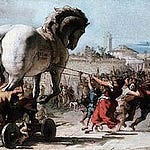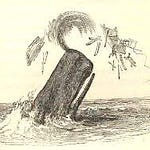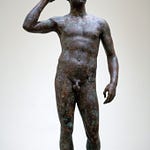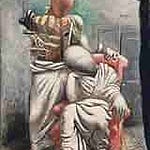I promised a commentary on the Preface to Beyond Good and Evil but am really only commenting on one aspect of the Preface, namely, Nietzsche’s simultaneous disdain for conservative dogmatism and the democratic Enlightenment. The question of this essay is: How did Nietzsche preserve the high civilizational standards of old European dogmatism while adopting the Enlightenment’s attitude towards dialectics?
Apparently, Europe has been in a fight against dogmatism that Nietzsche thinks will end poorly, namely, in the unbending of the bow. Nietzsche wants to avoid this fate, but not by turning back towards dogmatism. Like the Enlightenment thinkers, he too will attack dogmatism. He will attack the same dogmatism attacked by the Enlightenment but will be more thorough or attack it in a different, more profound, way. In this essay, I want to set down what his way is, how it is that Nietzsche reaps the benefits of dogmatism without being dogmatic.
What is dogmatism? We can approach this question by looking at dogmatism’s two greatest errors: “the invention of pure spirit and the good in itself.” I will focus on the latter error. The “good in itself” is an invention suggested by dialectic. Under the knife of dialectical inquiry, a man will have to admit some “good.” What that good is cannot be dialectically determined; it is a “given” discovered by the dialectician and then examined. All attempts to avoid this investigation are doomed to fail, unless of course the interlocutor refuses to debate. Anyone confident and generous enough to engage a Socrates can be compelled—however briefly—to cough up his notion of the “good.” Let me provide an example:
Example: You want to distinguish between what kinds of books should be canonical. Obviously, canonical books must be good books. Not only should they be good, they should be the best. So, you have to find a way of distinguishing between better and worse. You say, “canonical books should be those books which promote truth, goodness, and beauty.” The problem: why can’t anyone lay claim to these? What can you say to some idiot who claims that Martin Luther King Jr. is America’s greatest philosopher?
Not only will some people give such absurd content to “best,” but many will try to avoid admitting the distinction between better and worse—i.e., they will lay claim to a canon (or any preference) without admitting the grounds for their claim.
A canonical work must be one of the greatest works available. The dialectician, understanding this sort of compulsion, searches out what stands in the place of “true, good, and beautiful.” And, if a man tries to wriggle out of necessity, the dialectician pins him down to that. That is, the choice cannot be avoided by saying that it’s relative, or that the question is determined by some authority (“whatever society thinks”); the dialectician brings the interlocutor, the wriggler, back to the necessity of choosing.
So: we have people who import nasty content into the highest things; and then we have another group of people I am calling the wrigglers, who don’t have the audacity to say that garbage is beautiful, but at the same time don’t want to disparage the garbage.
A philosopher-dogmatist does two things: he pins the wriggler down and then safeguards the true, the good, and the beautiful (and God) by making these into “things in themselves” and providing content to those things that will keep people from saying stupid things like “MLK Jr. was a philosopher” or “there is no such thing as philosophy.” (And indeed, if those we call philosophers were no better than MLK Jr, there indeed would not be such a thing as philosophy. This is not a joke.)
Enlightenment thinkers rebelled against the artistry of such dogmatists, specifically, they didn’t like the Christian content in things like “the true, good, and beautiful” and “God.” Instead of fighting over this content, they sought to break the power of dialectic by making it as hard as possible for a dialectical thinker—be he a philosopher, theologian, philosopher-theologian, metaphysician, etc.—to make the necessity for choosing (and therefore for wisdom) evident. The Enlightenment thinker hides the necessity of wisdom, of knowledge. These thinkers came to the defense of the wriggler rather than debate the content of the true, the good, and the beautiful.
Platonic Approach
I went some way to explaining the Platonic approach in the previous essay, but my way of explaining this phenomenon is untried. Going over the ground again is helpful.
I will talk specifically about the Throne and Altar regime in a later essay but want to use it as an example here, because it was this regime the Enlightenment attacked. Let’s compare the Enlightenment approach to the Platonic approach: each would attack the Throne and Altar regime differently.
Every regime must offer some way of distinguishing a murderer from a killer, i.e., unjust violence from lawful or legitimate violence. One approach adopted by the Throne and Altar regime was to say that no human being has a right to kill. Any man who kills another has transgressed; he has played God. – Obviously, this argument cannot be complete, because no good law or regime leaves the good guys so unarmed. The argument continues: Only God has the right to kill, but he gives this right to some men by anointing them, as King David was anointed. The anointed has the right to kill other men. Subjects deputized by the anointed also have this right.
I don’t say this was Throne-and-Altar’s only line of thinking on this matter. The notion of Divine Right lasted a long time and withstood many attacks. This way of distinguishing between killing and murder is an example of the kind of thinking that was popular during the time of Louis XIII and Louis XIV.
A Platonist would not have dismissed this argument either. There is a lot of truth to it; it could accomplish a public good; it secures right action to a sharp line of dialectical inquiry that ends, inevitably, in the existence and power of God and man’s duty to glorify him. However, if a Platonist wished to attack it, he could.
Let’s say that this line of argument was being employed by a nasty Communist, who might rephrase it as: no one has a right to kill; only the people have a right to kill; the people can designate authorities to execute this right as tools of the people.
The Platonist could attack it by asking if the People ever ask their instruments to kill unjustly? “No. The People always use their instruments rightly.” And what emerges is this interlocutor’s belief that there is a limiting power to the people, i.e., his own notion of justice.
But the dialectician forces the interlocutor down paths. Either the People always require justice or they don’t. If the People sometimes command unjust killings, then it is obvious men don’t have to obey the People in all cases. Which is to say, it becomes obvious very quickly that “justice” rules over the People and everyone else; and thus, those who see “justice,”—who know what it is—have more authority to act on its behalf than the People do.
But it might be asserted that the People always require justice—that every time the People has ever commanded a killing, they have been just in their command; if this difficulty arises, it becomes a question, like you find in the Euthyphro, of whether the People abides by justice or is the source of justice—i.e., the dialectician will force the conversation down another path. If the People abides by justice: then, once again, those who comprehend justice themselves stand as equals with the People in being able to act on its (justice’s) behalf. That is, you don’t need a dictate from the People to know what justice is if the people are abiders in justice rather than makers of justice.
So, finally, the dialectician might have to deal with someone who asserts that you must depend entirely on the People because the People are the makers of justice. – If a dialectician meets someone who is willing to go this far, the questioning becomes more difficult and varied. The gist is: how can the interlocutor, a subject of the People, know how to obey the People? Even if the People declare their will, are They required to not change their mind the next second? What if They consider disobedience just and good?—how would you know? Etc. The variations in argument are endless and yet bounded by these kinds of questions.
Enlightenment Attack
The enlightenment attack has a different character and is less compelling, i.e., is literally less coercive than the Platonist attack.
Here is an example of the Enlightenment’s attack on Throne and Altar’s distinction between murderer and killer:
“What a farce it is to say that this or that man has a right to kill because he is anointed by God. Anyone can say that. Every two-bit tyrant will make this claim to hide his misdeeds. You debase God making him responsible for these petty human concerns. Men with courage take responsibility for their own actions; they take the risk of error on their own heads, rather than passing it off on God.”
This kind of attack is not compelling. To use Straussian language, it does not penetrate the Fortress of Morality. An enlightenment thinker browbeats every which way, but cannot make an interlocutor blush.
The Enlightenment philosophers went after the famous “Summum Bonum” (Greatest Good, i.e., Salvation or Wisdom), that is, they attacked the idea that there is an authoritative human association with a specific end. These philosophers gave support to the type of man I called “the wriggler.” Enlightenment philosophy never sought any confrontation with the regime of Divine Right; or, they did but they went a long way to hide this. The goal was always to make such a confrontation appear nigh impossible, to bring the possibility of such a confrontation into serious doubt. “Every king claims to be wise, or divinely ordained… it's impossible to know who is such a thing, even if there is such a thing. It’s a useless claim. Let’s drop it. It’s ungentlemanly to assert a divine right or a right according to wisdom or excellence.”
Now we can compare the two approaches:
The dialectical inquiry presumed a greatest good, an ultimate ground for choosing between one and the other. A king could know justice and so be a wise king; and in any event, someone must know, or claim to know, what justice is for the conversation to take place at all. Either the interlocutor knows what justice is, or the king does.
The enlightenment inquiry loudly draws attention to the fact that everyone presumes to know the greatest good. Every king—and indeed, every man—thinks he knows what justice is and so the claim to know justice is essentially worthless. This goes for all ideals generally.
Nietzsche’s Method
Nietzsche adopts the Enlightenment approach, but tries to restore the same sort of striving and love of excellence associated with the ideals of Platonism, the ideals the Enlightenment approach denies. Why does he doe this?
The ideals safeguarded by dialectical analysis are important for being a good person and living a good life. If justice can be known and wisdom can be exercised, then those without this knowledge or power are unjust or slaves (or both). The existence of justice and wisdom, their reality and possibility, gives life “weight”; only once we admit that it’s possible to be a mutilated man living an aborted life can we begin to seek out the good life. If there is nothing seriously good about life, there is nothing seriously wrong with wasting your life. The Enlightenment denial of justice and wisdom endangers what makes life worth living.
The Enlightenment approach “de-centers” man. Yes, it is true, all kings might claim to be just and wise; they might even all claim to be chosen by God. Even if every man is “orthodox unto himself” (to use a Lockean phrase) and believes he has the truth, that does not mean the truth is not possible. – Once it becomes a maxim that no power can be attributed to what can be universally claimed, then men stop believing in their right to exercise power. Decadence overwhelms them and a younger, more confident people—a people that doesn’t mind if some other idiots claim to be wise and just, because it believes in its wisdom and justice—will come along to knock them off.
What Nietzsche does with this fact is accept the mode of Enlightenment definition, that any man can claim to be just and wise, but he revives a (non-dialectical) reason to believe in justice and wisdom: everyone believes in their personal ideal, he admits this, but he goes on to explain that every man’s personal ideal is a result of his quality; there are good men, and these have good ideals; there are bad men, and these have bad ideals. The Enlightenment taught that every man claiming to be “Wise and Just” was a reason to disregard such claims; Nietzsche suggests we take those claims seriously, when they come from good men. A conscience is only as good as its possessor.
Nietzsche cannot compel a bad man to admit to himself that he doesn’t even know what justice is; Nietzsche cannot make such a man blush before others. What Nietzsche can do is appeal to everyone: isn’t this man’s notion of his justice inseparable from what we all see, namely, his badness?
What is an Appeal? Example: Appeal in Hobbes’ Introduction
Hobbes opens his Leviathan making an appeal. (I am making the point that enlightenment philosophers make appeals, whereby the Platonic philosopher compels):
But let one man read another by his actions never so perfectly, it serves him only with his acquaintance, which are but few. He that is to govern a whole Nation, must read in himselfe, not this, or that particular man; but Man-kind; which though it be hard to do, harder than to learn any Language, or Science; yet, when I shall have set down my own reading orderly, and perspicuously, the pains left another, will be onely to consider, if he also find not the same in himselfe. For this kind of Doctrine, admitteth no other Demonstration.
Hobbes is going to explicitly deny the kind of dialectical demonstration he knows full well exists, and which he himself will use at times to bolster his enlightenment-rhetoric. Hobbes’ philosophy cannot compel anyone. It is very suggestive. Men read it and think to themselves, “I do lock my doors and distrust people.” But they can also say “I don’t lock my doors or distrust people and I don’t like his conclusions about the people who do!” Many academics today make their living pretending to refute Hobbes’ “non-demonstrable” arguments. And Nietzsche is the same as Hobbes on this point. He is not speaking demonstrably. He is avoiding demonstrable talk, because he is avoiding dialectical analysis. He is avoiding dialectics because of the weakness of dialectics vis-à-vis mad men who would claim things like “MLK Jr. is a philosopher.” Nietzsche does not appeal to things like “the desire for self-preservation”, which seem so very evident and therefore so very powerful. Instead, he appeals to our sense that some men are better than other men, an appeal that would not be very interesting in earlier, illiberal, ages. He appeals to our suspicions that men tend to hide from themselves their own weaknesses.
To bring things back to the initial point: Nietzsche will not rely on dogmatism (the belief in a transcendental set of “things in themselves” that would anchor things like wisdom and justice). Nor will he permit the bow to be unbent (by denying the compulsive power of ideals). He will bring about the proper tension by non-dogmatically establishing the importance of ideals.
The Nietzschean Plane
This project goes from moral concerns down to more strictly “natural scientific” concerns. And here I’m pretty directly riffing on Strauss.
The Platonists and enlightenment thinkers like Epicurus used to do battle, and their battle was fought on a specific plane, with specific opposing camps. In the Platonic camp, man’s ideals were held up and defended. It was denied that man, and life generally, could be explained materialistically. On the other hand, in the Epicurean camp, the opposite view was held. It was said that all of man’s ideals were masks and different names for his one true aim: pleasure. The Epicureans held that man, and indeed everything, can be explained materialistically. Life was to be understood in terms on non-life; the animate is just a more intricate machine than the inanimate.
Nietzsche claims to have transcended this debate altogether. He can revitalize philosophy because he isn’t bound dogmatically and doesn’t make the mistake of viewing life mechanistically. Contrary to both Platonists and Epicureans, Nietzsche replaced “pleasure” with “will to power”; and thereby explained that all life, and indeed everything in the world, including the inanimate things, was driven by will to power. He refused to let men explain man and the higher forms of life in mechanistic terms. It’s the other way around: even the stupid stone is to be understood in terms of will. The lower is always understood in light of the higher.
Problems:
It’s possible I don’t fully understand the Nietzschean plane, in which case, it is possible that once I and others do, we can embrace it and use it. Either I don’t understand it, or it has weaknesses. I will list what I think its weaknesses are.
First, replacing “pleasure” with “will to power” does not really save ideals. It just makes their defense seem a little more sensible. I am open to Meier’s recent suggestion that the Will to Power doctrine was not only not sincerely held by Nietzsche, but that it was going to be superseded in his later works. If we think back to the argument above: if everyone can claim to be just, and everyone thinks he is wise and good, then these claims are called worthless by the enlightenment. Nietzsche provides a way of distinguishing between better and worse claims, even though he admits everyone makes these claims. But his way is just to say some men are good and others are not good; some are masters and healthy and others are slaves and unhealthy. Is there a reason given why we should wish to be one or the other? If the slaves are in power and slaying (literally and figuratively) the master-men, what could be wrong with being a slave? To put it very straightforwardly: why would someone prefer to be Nietzsche over Yuval Noah Harari or Karl Popper? Nietzsche was a failure in his lifetime, whereas these garbage intellectuals enjoyed immense success during their lives. But who cares about the truth, or, why should we care? Nietzsche clearly does care. I think he had something more than the Will to Power doctrine to explain why he cares but the Will to Power doctrine evidently does not explain this. Or maybe you can educate me.
Second issue: In order to see all things in light of the higher, to see the stone in terms of Will to Power, Nietzsche has to deny the distinction between the real and apparent world. “We only have access to the apparent world, and our access involves Will to Power, which in turn means we have no choice but to understand the stone in terms of Will to Power.” Well okay, but once we even admit this to ourselves… haven’t we thereby recognized the distinction between “real” and “apparent” and gained access to the real over the apparent world? Why would we try to understand “the world seen from the inside” when we, by realizing we are inside, gained access intellectually to the “outside”? Why not try to understand the stone in other terms besides the will to power; why not try to free ourselves from the apparent world? “We can’t…” But by having this discussion we already have. And let’s be honest: dialectics is “the world from the inside” and enlightenment rhetoric is the world from without.
Third issue: I dislike Nietzsche’s devaluation of Platonic dialectic. This is a matter of personal taste. A full explanation of my dislike would involve an examination of Nietzsche’s “the problem of Socrates.” I have written on this question, in part, namely, how he mis-represents Socrates’ last words. I may take up the whole section from Twilight of The Idols in a future essay. I think Platonic dialectic is absolutely necessary for our time, both for the Pagan-right and Christian right. Zarathustra went to the mountain, but what did he teach in the mountain? The multitudes must sense the greater power of philosophy. A young man can enjoy the zingers of a Hobbes or Nietzsche, but he also wants the satisfaction of dialectical compulsion. Every serious young man wants this.
Essentially, there is no theology without dialectics, and I like theology. Where there is no respect for theology or its origination in Platonic political philosophy, everything becomes dull incredibly quickly. Even in the Nietzschean world: everything degenerates quickly into a third-rate search for reasons someone is coping. There are no interesting debates and few people are interested in debates as a result. The great chain of being—between those who can discipline, who can bring a compelling power, and those who need such compulsion—is severed by all enlightenment style philosophizing, no matter what the plane. And while Nietzsche and others of course can compel dialectically, and do compel dialectically, they really hid this power of theirs much deeper than Plato did. I want to make this power of philosophy manifest.














Share this post